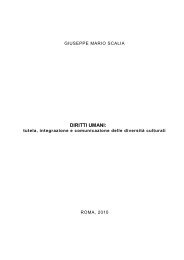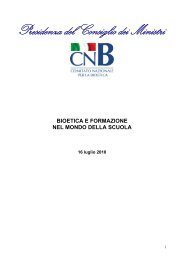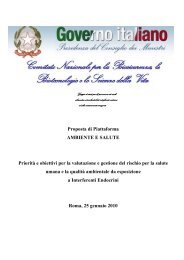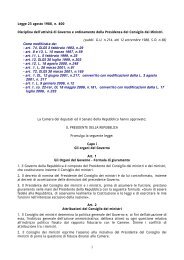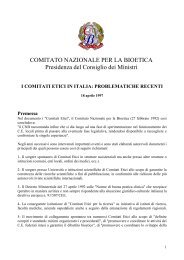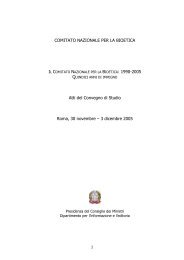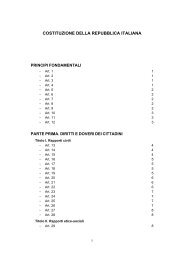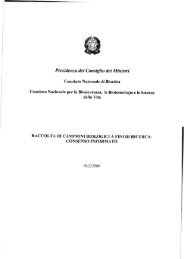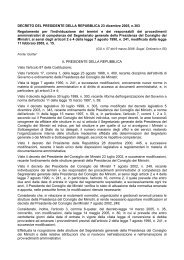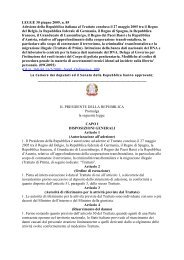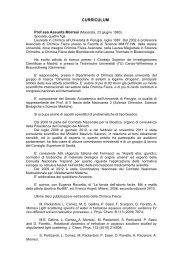President
President
President
You also want an ePaper? Increase the reach of your titles
YUMPU automatically turns print PDFs into web optimized ePapers that Google loves.
treatment, even in the awareness that a broader and more radical rethinking of<br />
the prison system is to be hoped for in the future.<br />
The opinion quoted here above offers the precedent that is also useful to<br />
define suicide in prison as a bioethical problem, with all the due differences. It<br />
points out the way of ‘a radical change in the way the adult world, in its multiform<br />
expressions and functions, looks at adolescence’ to significantly affect the<br />
dynamics more often underpinning adolescent suicide. Starting from here, in<br />
the chapter on bioethical indications the NBC reflects briefly on the delicate<br />
balance between the aspects of individual responsibilities and<br />
environmental/social ones concerning the understanding of suicide; between<br />
the risks of charging the phenomenon to individual characteristics with the<br />
consequent social deresponsibilisation, on the one hand or, on the other, of<br />
falling into a hyper/pseudo social protectionism of the subjects identified as<br />
being ‘at risk of suicide’. Hence the NBC’s option not so much in favour of a<br />
selective prevention for individuals/groups ‘at risk’, but of a prevention<br />
understood as the promotion of ‘suitable elements to support a process of<br />
identity development in this phase of their lives’. This latter indication which<br />
distances itself from the increasingly pervasive use of the at ‘risk’ category, is<br />
particularly valuable with respect to the specific demands of prison.<br />
Taking this document as a starting point, prison suicide can be tackled as<br />
both a warning light for the subjective hardship of the prisoner in the face of the<br />
loss of freedom, and as the symptom of social inadequacy, not so much to<br />
‘protect’ the prisoners, but to respect their fundamental rights. The principle<br />
according to which imprisonment takes away only the right to freedom of<br />
movement is often disregarded: as a consequence, the rights to safety, health,<br />
reintegration and other rights too are not guaranteed. For this very reason the<br />
prison is often an environment that can foster or hasten a possible decision to<br />
kill oneself. As the French Committee of Ethics states, ‘Prisons are also the<br />
cause of disease and death: they are the scene of regression, despair, selfinflicted<br />
violence and suicide’ 253 .<br />
From this perspective the prevention of suicide is closely linked to the<br />
protection of health, with another important bioethical aspect concerning the<br />
equity of access to healthcare resources. There are two critical points<br />
therefore: the lack (sometimes even absence) of respect of civil and human<br />
rights; the imbalance in the exercise of such right among prisoners and free<br />
citizens: the figures on the high number of suicides in prison (about twenty<br />
times higher than the general population rate) can therefore also be interpreted<br />
as a discrimination index.<br />
It is true that suicide is an act of will, the result of an individual choice,<br />
sometimes difficult to understand by others in its motivations and as such must<br />
always be looked upon with caution and respect. But the respect for the<br />
unfathomable suffering of whoever decides to resort to this extreme gesture<br />
does not only counter, but, on the contrary, spurs on the common commitment<br />
to remove all the conditions capable of fostering or bringing about suicide.<br />
Therefore, the prevention of suicide comes under the defence of health<br />
and life to all effects, as the promotion of an environment that respects people<br />
and leaves open a prospect of hope and a horizon of development of<br />
subjectivity in the journey towards social reintegration.<br />
253 “La santé et la médecine en prison”, Comité Consultatif National d’Ethique pour les<br />
Sciences de la Vie et de la Santé, opinion No. 94, 26 October, 2006, p.8<br />
191



